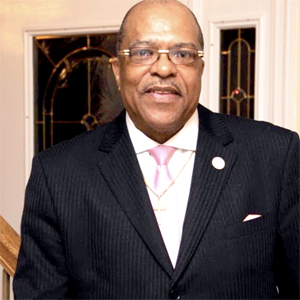Scriptural text: JEREMIAH 1:6-10; 26:8-9,12-15
By: REV. DR. ISAIAH ROBINSON, JR.

KEY VERSE The Lord said unto me, say not I am a child: for thou shalt
Go to all that I shall send thee, and whatsoever I command thee thou shalt speak. (Jeremiah 1:7 , KJV)
INTRODUCTION: The prophet Jeremiah ministered during one of the most turbulent periods of Judah’s history, spanning the reigns of five kings from Josiah to
Zedekiah (627-586BC). In Jeremiah 1:6-10, God commissioned the prophet Jeremiah to deliver a message to Israel and the surrounding nations. This call occurred in Jerusalem around 626 BC, during the reign of King Josiah. Even as religious reforms were underway during this period, tensions were rising because foreign powers posed a growing threat to God’s people. Despite Jeremiah’s initial
reluctance to God’s call, the Lord assured His prophet that he would indeed have all that he needed to speak on God’s behalf. At a later time in Judah’s history, the Babylonian influence increased in the region and Judah faced political instability. Jeremiah delivered a prophecy of doom, declaring Jerusalem’s imminent destruction. Jeremiah’s message enraged the people, and before the authorities, he defended his words and asserted that his message came from God. Although Jeremiah’s ministry lasted more than forty years, most people rejected his message. He is known as the “weeping prophet” because of his grief over God’s message of judgment on Judah. Based on these outcomes, many people considered Jeremiah a failure. In God’s eyes, however, Jeremiah was a faithful servant because he obeyed God’s word regardless of the cost.
Jeremiah’s Call (1:6-10). In response to God’s call, Jeremiah expressed a natural sense of inadequacy about an overwhelming assignment. Jeremiah lacked confidence in his communication skills or simply felt like he was too young; he effectively said, “I can’t. Whatever his age, Jeremiah thought that his age would hinder his effectiveness as a prophet. This feeling speaks to the insecurities of many people who are called to an important task, especially when they feel unprepared or ill-equipped. In response to Jeremiah’s doubts and fears, God issued a command: “Do not say, I am only a boy.” With these words, God invalidated any thoughts that age, skill, or readiness are barriers to fulfilling His purpose. This statement urged Jeremiah to trust in God’s plan rather than relying on his assessment of his qualifications. God assured Jeremiah of divine support: “You shall speak whatever I command you.” Jeremiah was to be obedient and faithful. He was called to speak God’s word with divine authority. God’s reassurance: “Do not be afraid of them, for I am with you to deliver you.” This is a profound promise of God’s presence and protection. The Lord then “touched” Jeremiah and put His “words” into the prophet’s mouth. God empowered Jeremiah for his ministry.
Conflict Between Prophet and People (26:8-9). Jeremiah delivered God’s message, which promised destruction for the temple and Jerusalem. Yet, Jeremiah noted an alternative: If the people repented of their disobedience and obeyed the Lord, He would change His mind about the coming disaster. Instead, the priest, prophets, and people who heard Jeremiah’s words were outraged. Believing that his words were false and blasphemous, they violently “laid hold of him.” They sought to kill, likely because they considered him a false prophet who blasphemed the Lord and the temple. Jeremiah had warned the people that their fate was coming upon them. Jeremiah’s dire prophecy was unwelcome and unacceptable.
Jeremiah Defends His Prophecy (26:12-15). The violent mob wanted to put Jeremiah to death, but “the officials of Judah” intervened. They immediately convened a trial at the New Gate in the Temple. After the religious leaders presented their charges, Jeremiah began his defense. Though his life was at stake, he didn’t cower, apologize, or retract his words. Instead, he boldly asserted that his prophecy was not his own; God alone was responsible for the prophet’s dire message “against this house and this city.” Just as God commanded him, Jeremiah faithfully declared God’s words about the judgment that was coming as a result of the people’s disobedience and unfaithfulness to the Lord. To escape the impending destruction, Jeremiah urged them to amend their ways and to obey the voice of the Lord, your God. If the people were to change their behavior and return to God, He would “change His mind” and forgo the ‘disaster” that He promised. This was a message of hope, which demonstrated God’s characteristic mercy even in the face of wrath. Jeremiah remained steadfast in his situation and exhibited a remarkable sense of courage, personal resolve, and faith in God. He remained steadfast in his mission to convey the truth, regardless of the potential repercussions. Jeremiah knew that the officials had power over his immediate circumstances, but he trusted that God had ultimate control of his situation and his life. Jeremiah showed an unwavering faith in the Lord even when his life was in grave danger. This is a reminder that personal limitations do not disqualify us from pursuing and fulfilling God’s purpose. God equips those He calls, offering His guidance and strength that far exceed our abilities. This underscores the importance of trusting the Lord, especially in difficult situations. God’s truth usually challenges societal norms, thus it often brings God to give His people courage to consider and accept it when we speak gently. Jeremiah’s example shows the value of speaking the truth with humility, especially when responding to critics.

